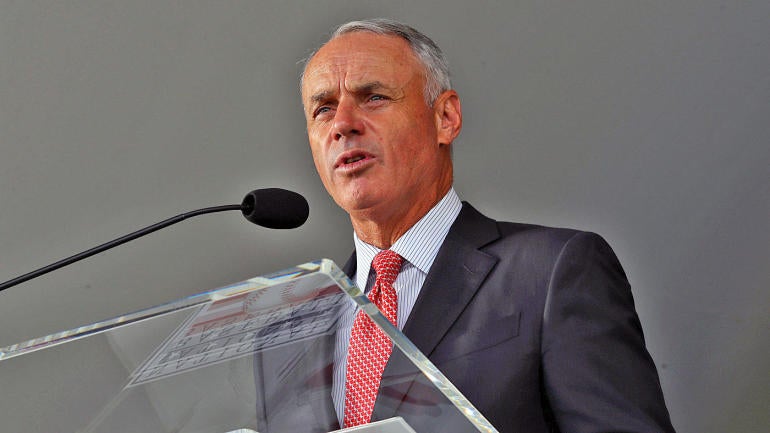
Major League Baseball commissioner Rob Manfred spoke to reporters on Thursday morning, just hours after the team owners voted unanimously to lock out the players and trigger the league's first work stoppage since 1994-95. Though the lockout coincided with the expiration of the Collective Bargaining Agreement, it should be noted that negotiations could have continued without shutting down the league.
"It's not a good thing for the sport. It's not something that we undertake lightly," Manfred said about the lockout. "We understand it's bad for our business. We took it out of a desire to drive the process forward to an agreement now."
Manfred alleged the league didn't observe a sense of urgency from the MLB Players Association to make a deal. Locking out the players, Manfred claimed, was the owners' way to apply "pressure" on the union and make progress in negotiations.
"People need pressure sometimes to get to an agreement," he explained. "But candidly we didn't feel that sense of pressure on the other side during the course of this week. The only tool available to you under the act is to apply economic leverage."
That Manfred puts the blame squarely on the Players Association should not come as a surprise to anyone; after all, he works for the owners. Union chief Tony Clark, who later spoke at his own press conference, said that the "the lockout won't pressure or intimidate players into a deal that they don't believe is fair."
Below, we've highlighted four other takeaways from Manfred's first press conference of the lockout.
1. No new meetings scheduled yet
Despite Manfred's stated desire to hasten negotiations, the two sides have not scheduled a new meeting since the lockout commenced. Wednesday's supposed last-ditch effort to avoid a lockout saw the two sides meet for all of seven minutes. Both parties are scheduled to depart from Dallas, Texas on Thursday. (Clark, for his part, said, "It would have been beneficial to the process to have spent as much time negotiating in the room as it appeared was spent on the letter.")
2. Feared vulnerability to a strike
Manfred's statement used the legal term "defensive lockout," which essentially means the league feared the players would strike. Manfred confirmed as much during his press conference, noting that playing without a new CBA in place would've made the league vulnerable to a strike. In layman's terms: Manfred and the owners wanted to prevent the players from gaining leverage by having that option at their disposal.
3. No rule change proposals
Throughout negotiations, the two major points of emphasis appeared to be teams' anti-competitive behavior and the now-outdated player compensation model. Manfred, at minimum, confirmed that neither side's proposals have included any actual on-the-field rule changes, including, seemingly, the universal designated hitter. It's unclear if any rule changes will be folded in at a later date.
4. Optimistic season won't be compromised
Despite all of the above, Manfred stated that he remains "optimistic" the season will not be compromised and that games will not be canceled. This is the fourth lockout in MLB history; each of the first three were resolved within 40 days, and none of them saw MLB cancel or postpone a regular-season contest as a result.
"bad" - Google News
December 03, 2021 at 12:18AM
https://ift.tt/3oenxjc
MLB lockout: Commissioner Rob Manfred calls work stoppage 'bad for business' - CBS sports.com
"bad" - Google News
https://ift.tt/2SpwJRn
https://ift.tt/2z7gkKJ

No comments:
Post a Comment